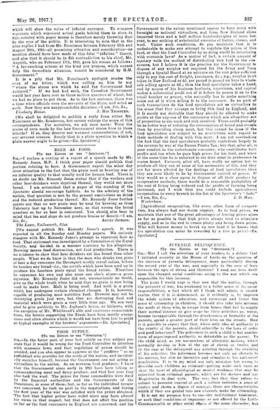BEER AS FOOD.
ITo THE EDITOR Or TEL " SPECTATOR -"I Sut,—I enclose a cutting of a report of a speech made by Mr. Kennedy Jones, M.P. I think your paper should publish that portion relating to beer. A Government expert the other day drew attention to the fact that the grain used in brewing was of an inferior quality to that usually used for human'food. There is no doubt (as Mr. Kennedy Jones states) that if the workers and other beer-drinkers were deprived thereof, they would cat more bread. I am astonished that a paper of the standing Of the Spectator should encourage faddists. -As to the .sobriety of the • nation, that question is met by the present restrictions on drink and the reduced production thereof. Mr. Kennedy Jones further points out that no new grain may be used for brewing as from February last' upto November next, so that covers the bread question so far as beer is concerned. You should also bear in mind that tea and slops do not produce brains or muscle.-1 am.
The Lawn, Nailsworth. Clot.
[We cannot publish Mr. Kennedy Jones's speech. It was reported in all the- Sunday and Monday papers. We entirely disagree with Mr. Kennedy Jones's attempt to represent beer as food. That -statement was investigated by a Committee of the Royal Society, And decided in a. manner contrary to his allegation. Brewing. means food destruction, not food production. There is no evidence to show that beer drinkers eat less bread than other people. What we do know is that the man who drinks two pints of beer a day consumes the Dev.onport weekly cereal ration, before lie touches any bread—i.e., the cereals which have been used up to produce his fourteen pints equal the bread ration. Therefore he consumes his own and also some one else's share—a gross injustice. Mr. Kennedy Jones did not, unconsciously no doubt, .give us the whole truth when he said that no grain is now being used to make beer. Malt is being used. And malt is a grain which has undergone certain chemical changes. It is, however, 'capable of producing most nutritive food. Brewers may not be destroying grain just now, but they are destroying food and material which were grain a very little time ago. We are very glad to give publicity to Mr. Jephson's letter, as 'hitherto, with the exception of Mr. Whitbread's able and courteous communica- tions, the letters supporting -the Trade have been mostly anony- mous and often abusive which it-would not have been fair to print' as typical -examples of the brewers' arguments.—Ee. Spectator.]


























 Previous page
Previous page